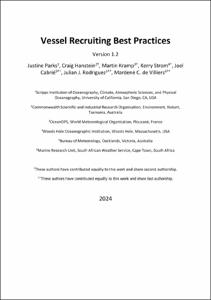Notice
This is not the latest version of this item. The latest version can be found at: https://repository.oceanbestpractices.org/handle/11329/2583.2
Vessel Recruiting Best Practices. Version 1.2.

View/
Average rating
votes
Date
2024Author
Parks, Justine
Hanstein, Craig
Kramp, Martin
Strom, Kerry
Cabrié, Joel
Rodriguez, Julian J.
de Villiers, Mardené C.
Status
PublishedPages
14pp.
Metadata
Show full item recordAbstract
Ships of opportunity, such as commercial transport, fishing, recreational, and research vessels, are excellent resources to reduce the costs of sea-going data collection. Because they are already operating in a given ocean region, they can provide a research equipment platform without the primary expense of chartering. While many vessel operators are eager to assist researchers for the good of society, if the operation is non-essential to their enterprise, the partnerships are susceptible to termination due to the slightest conflict. One bad incident can cause a company or an entire industry segment to enact policies against non-essential personnel, therefore, it is critical for users of ships of opportunity to carefully follow protocols designed to create a safe and positive experience for both parties. These best practices for successfully partnering with ships of opportunity to engage in meteorological and ocean observing activities emphasize the recruitment of commercial vessels in.....
Publisher
Scripps Institution of OceanographyLa Jolla, CA
Document Language
enSustainable Development Goals (SDG)
14.aMaturity Level
MatureCitation
Parks, Justine, Hanstein, Craig, Kramp, Martin, Strom, Kerry, Cabrié, Joel, Rodriguez, Julian J. and de Villiers, Mardené C. (2024) Vessel Recruiting Best Practices. Version 1.2. La Jolla, CA, Scripps Institution of Oceanography, 14pp. DOI: https://doi.org/10.25607/OBP-2029Collections
 Repository of community practices in Ocean Research, Applications and Data/Information Management
Repository of community practices in Ocean Research, Applications and Data/Information Management